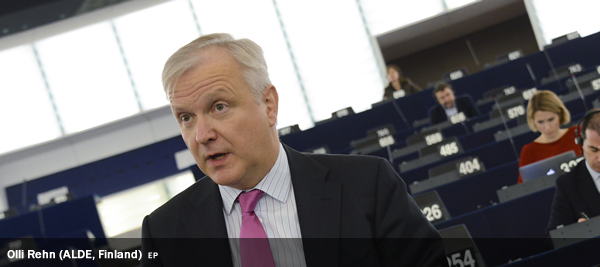As parliamentarians across the EU discussed economic governance in the EP this week, French socialist Ms Pervenche Berès, responsible for an EP report evaluating the EU’s economic governance framework, and EP vice president, Finnish liberal Olli Rehn, said they believe in a mixture of structural reforms and investment to help boost the economy.
“The euro area and the EU now need to adopt another fiscal stance, which boosts investment, sustainable growth and job-creating structural reforms,” said Berès, while Rehn commented: “The consolidation of public finances over the medium term had to be accompanied by structural reforms and targeted investments to underpin sustainable growth and employment.”
The European Central Bank (ECB) announced on 22 January that it was going to buy up to €60 billion worth of assets every month over the next 19 months. This programme – also known as quantitative easing – aims to revive Europe’s economy.
“The ECB’s asset purchase programme should be welcomed,” said Berès, who wrotethe final report of the EP’s special committee on the financial, economic and social crisis in 2009-2011. “However, it cannot be the only instrument that contributes to the revival of the European economy. The current economic governance framework should be improved to allow for a better debate, notably as regards the assessment of macroeconomic imbalances and “spillover” effects between member states.”
Rehn added: “In the short term, the quantitative easing of the ECB combined with the reduced oil price and strong US economy will lift growth prospects in Europe. But in the longer term, this requires that all key players – not only the ECB – do their job. It’s about the transmission of the monetary stimulus to the real economy, businesses and households.”
More democratic oversight needed
The EU coordinates the economic policies of the member states in a process known as the European Semester. Countries can be asked for additional budget cuts or structural reforms. Both MEPs agree that it would benefit from better involvements from parliaments. Berès said: “The European Parliament and national parliaments – but also social partners – should be better involved in the process. For instance, it means that the Annual Growth Survey should be dealt with according the co-decision procedure.”
Rehn said he also thought parliaments had an important role to play: “I believe that the European Parliament can play an important role as a forum for the exchange of views and as watchdog. National Parliaments often are much less heard in the process of the National Reform Programmes. I’d like to see progress here.”
Greece
The two MEPs also commented on the recent elections in Greece where the new government has called for a new approach on the country’s debt problems. Berès said: “Syriza’s victory cannot only be viewed as a reaction to the lack of democratic accountability in the EMU. But it certainly sends a strong political signal concerning the will of EU citizens to end the era of anti-democratic decision-making processes, as embodied by the so-called Troika.”
“I hope the new government tackles tax fraud and vested interests,” said Rehn. “There is a turnaround in the Greek economy to growth and job creation which should be strengthened through reforms.”
